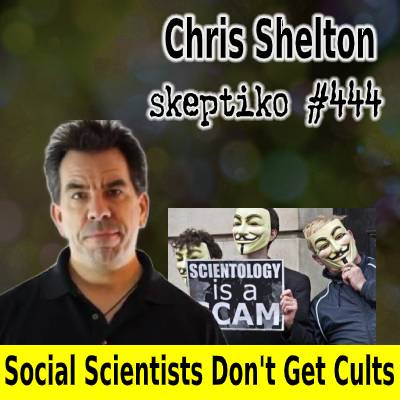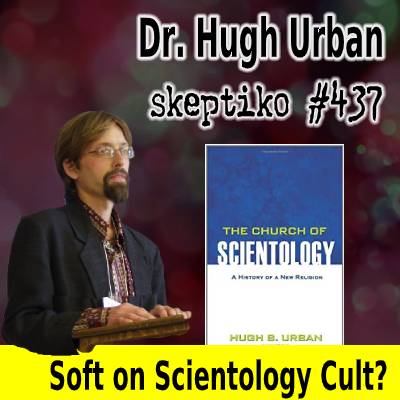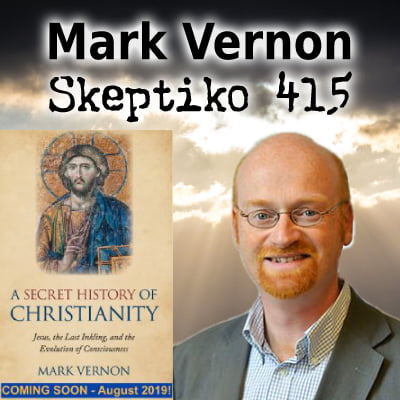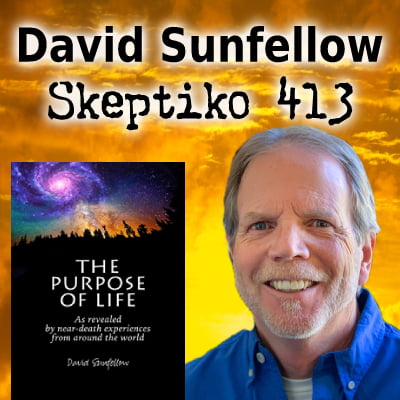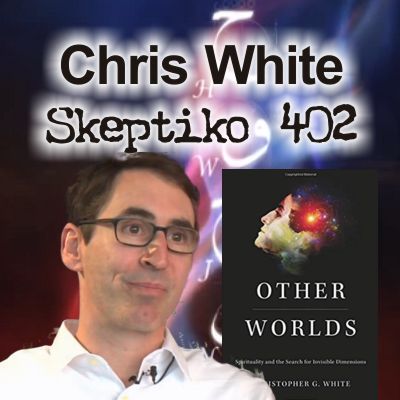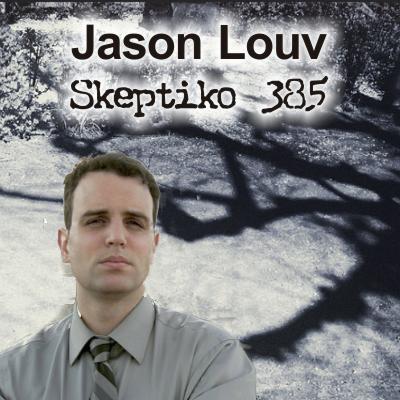Rick DeLano's movie, The End of Quantum Reality makes a strong case against scientific materialism, but then there's the Catholic...
Tag: science and religion
Dr. Rich Grego, Can Academia Handle the Evil Question? |445|
Dr. Richard Grego explores how academic objectivity has hamstrung our understanding of extended consciousness. photo by:...
Chris Shelton, Social Science’s Blind Spot Regarding Cults |444|
Chris Shelton was born into Scientology and can't understand scholars who don't see it for the cult it is. photo by: Skeptiko ...
Dr. Hugh Urban, Scholarly Look At What Many Call Cults |437|
Dr. Hugh Urban brings scholarly rigor to the study of Scientology and Osho, but what about consciousness? photo by: Skeptiko I...
Mark Vernon, Christianity and the Evolution of Consciousness |415|
Author, scholar and psychotherapist Mark Vernon traces the evolution of consciousness. photo by: Skeptiko Alex Tsakiris: Today,...
Alex Tsakiris, Four Questions About the Future of Skeptiko |414|
Alex poses four questions about our relationship to extended consciousness realms and discusses the future of Skeptiko. photo by:...
David Sunfellow, Can the Scientific Study of NDEs Reveal the Purpose of Life? |413|
David Sunfellow's decades of study on near death experiences has led him to some clear-cut conclusions about the purpose of life. ...
Dr. Chris White Optimistic About Science Spirituality Crossover |402|
Dr. Christopher White traces multidimensional science concepts through spiritual thinking. photo by: Skeptiko I keep having...
Jason Louv, A Strange Mix of Scientism and Magick |385|
Jason Louv has a reputation as a chaos magician, but he's down with materialistic science-as-we-know-it? photo by: Skeptiko I have an...
Dr. Rupert Sheldrake Brings Science to Spiritual Practices |376|
Dr. Rupert Sheldrake finds scientific support for benefits of spiritual practices. photo by: Skeptiko Alex Tsakiris: Today I’m so happy to...
Gordon White, Pieces of Eight: Part 1, Christianity’s Shadow |332|
Gordon White's new book challenges our understanding of Chaos Magic and religion. photo by: Skeptiko Gordon White's new book Pieces of Eight:...
Why meditation and science are on a collision course. Mind > brain |268|
Dan Harris is a star at ABC News, but his investigation of meditation and science turned into more than a news story. Meditation works... so say...
Are some Christian scholars changing their opinion of divinity? |263|
Alex Tsakiris of Skeptiko interviews Christian mystic Albert LaChance and religious scholar Rebecca Goodwin on experiencing spirituality, and the...
Dr. Jim Tucker compiles largest database of past life memories |239|
Interview with University of Virginia professor Dr. Jim Tucker about research of children who remember past lives. photo by rogintakesphotos Join...
234. Global Warming, Climate Change and Our Illusion of Control
Click here for YouTube version Click here for forum discussion Interview with the Rick Archer host of Buddha at the Gas Pump, and John...
229. The 5 Things You Need to Know About Skeptiko
Click here for YouTube version Click here to post comments on AlexTsakiris.com Click here for forum discussion A re-introduction of the...
221. Atheist John Loftus Explains Why He’s a Biological Robot
Click here for YouTube version Click here for forum discussion Click here to post comments on AlexTsakiris.com Interview with atheist and Christian debunker John Loftus examines the philosophy of atheism. Alex Tsakiris: When we falsify this idea that you are a “biological robot”, and accept that’s absurd, and once we get past the idea that consciousness ends at death, which again, that’s where the evidence points, then a lot of things start falling differently in terms of how I orient myself to the world, how I orient myself to other people, how I orient myself to morals, purpose, meaning in life. You are not a biological robot, John. John Loftus: Okay. I disagree. I’ve said why. Alex Tsakiris: You say, “I am a biological robot. I am going to stand by that.” Right? That’s what you’re saying? John Loftus: Well, there’s no evidence for invisible beings, right? Entities. Alex Tsakiris: But you, as you live your life, you live your life like a biological robot? John Loftus: Everybody does. That’s all there is. Alex Tsakiris: Okay. John Loftus: Well, you have to look into the philosophical quandaries with trying to distinguish between mind and body. I mean, I taught the Introduction to Philosophy classes that you would probably be interested in looking at how they’ve tried to relate the mind and the body. They just really can’t do it. It’s really ludicrous to see how they do that. (interview transcript continued below) John Loftus - Debunking Christianity UPDATE: Follow-up Email Exchange (click here) Play It Listen Now: Download MP3 (64 min.) Read It: Welcome to Skeptiko, where we explore controversial science with leading researchers, thinkers, and their critics. I’m your host, Alex Tsakiris, and this episode of Skeptiko is yet another in this series I’ve been doing on Atheism. Now I do feel a need to tell you a little bit about how I came to do this interview because, as you know if you’ve listened, you just heard a similar kind of debate with philosophy professor Dr. Stephen Law. Actually, these two interviews with Dr. Law and John Loftus came about as the result of my interview on Episode 217 with Gary Marcus, because Gary Marcus is this NYU professor of psychology, bestselling author, writes frequently on consciousness issues, yet if you listen to the interview you’ll hear how he stumbled with some basic questions about consciousness.
...181. Peter Bannister of the American Church in Paris Sees Hope For Science and Religion Dialog
Interview examines the shortsightedness of the culture war between science and religion. Join Skeptiko host Alex Tsakiris for an interview composer and lecture series co-director Peter Bannister. During the interview Bannister considers whether Christianity has lost it’s mystery: Alex Tsakiris: Modern Christianity is wed to materialism in some fundamental ways that make it hard to pull it out of there. So this is the problem I have with the dialogue with some of my Christian friends. It gets down to doctrine. I keep pushing saying, “This doesn’t make sense. You can’t really have this doctrine. You can’t really have this belief set as rigidly as that,” but their fallback is, “Well, come on, I am a Christian.” And I think there’s a direct parallel with the scientists. I think the scientists, whether they say it explicitly or not, is saying, “well, come on, I am a materialist because at the end of the day if I can’t measure it I’m out of business.” Peter Bannister: I think you’ve made some perceptive points, particularly about the marriage of convenience, or Faustian pact between Christianity and I would say Rationalism. But what’s curious if you do the history is that that’s a relatively recent phenomenon. I think that there is a very close tie to the rise of a certain type of science and a religious rationalism which insists that the doctrine really is about questions of proof and questions of discursive knowledge, propositions, dogma in the worst sense. There are a lot of historians who say that really is a very shortsighted view of what the broader tradition really is about which is much more mysterious and a little bit more fluid than that. But the people don’t actually know this tradition very well because nobody’s ever really told them. The truth that we’re after is much more relational than propositional. A lot of people in Christianity and some other wisdom traditions and faiths are saying, “Hang on. One of the big problems in the world today is that we’ve got hooked up with this notion of dogma. It’s dogma in the sense of an effort to control.” I think control is really the key thing because as soon as you have a doctrine which you say corresponds to reality in a sort of one-to-one way that gives you a method of control. Alex Tsakiris: That’s the bridge we have to cross. Science is a religion. Atheism is a religion. And now we’re all on the same playing field. Peter Bannister: Because it’s our ultimate concern. I think, a very good definition of religion. It’s what is your ultimate concern? If you go back to the idea of who do we want around this table, obviously the entry fee, as you say, is a certain ability to let go or to say, “Okay, we all bring ourselves to this but we bring ourselves to this in an open way.” My hope—and you might say I’m naïve in this—is that there is a groundswell of people who have this openness and who are genuinely interested in following and examining the data in an open and intelligent way. And I think there is a big need for the construction of a community like that. Peter Bannister's Website Play It: Download MP3 (48 min.) Read It: Alex Tsakiris: Today we welcome Peter Bannister to Skeptiko. Peter holds graduate degrees in music from King’s College, Cambridge, and philosophical theology from the University of Wales. He’s an award-winning composer and performer and is co-directing a very interesting lecture series at the American Church in Paris promoting an increased and enhanced dialogue in the relationship between science and faith. Welcome, Peter, thanks so much for joining me on Skeptiko. Peter Bannister: I’m delighted to be with you, Alex.
...149. How Many Dinosaurs Fit on Noah’s Ark, Interview With Evolution Theory Expert Michael Flannery
Professor Michael Flannery explains how the theory of evolution was hijacked, and why Alfred Russel Wallace had it right all along. Join Skeptiko host Alex Tsakiris for an interview with author, historian and evolution theory expert, Professor Michael Flannery. During the interview Flannery explains how Charles Darwin’s data collection methods led to his ideas about survival of the fittest: Alex Tsakiris: This idea about competition, and how competition occurs, and how it affects the evolutionary process seems to be at the core of what this theory turns into. Explain the differences between Darwin’s view of competition and Wallace’s view of competition? Professor Flannery: Wallace tended to view competition occurring among groups in a demographic sense. Darwin tended to view it as individual competition. Alex Tsakiris: Again, we’re hitting notes that come up over and over again -- class, collectivism versus individualism… to me it seems obvious that Wallace was right. I mean, when it comes to competition for food supply, and what would make a certain species go extinct, it's primarily a group collective kind of thing. That just rings true. Professor Flannery: Right. And it’s an expression of how they collected. Remember, I said Darwin collected individual species and would examine them in great, great detail -- maybe just a few different species -- whereas Wallace was collecting huge numbers, 125,000 species. He’s collecting demographically. So he’s taking a look at how it was that certain plants and animals were found in some places and some zones and not in others. Darwin didn’t have anything near that level of sophistication. Professor Michael Flannery's Alfred Russel Wallace Website Play It: Download MP3 (53:00 min.) Read It: Today we welcome Michael Flannery to Skeptiko. Professor Flannery is Associate Director for Historical Collections at the Lister Hill Library at the University of Alabama, Birmingham. He’s here to talk with us about evolution, Darwinism, and his book, Alfred Russel Wallace: A Rediscovered Life. Professor Flannery, thanks so much for joining me today on Skeptiko. Professor Flannery: Thanks for inviting me. Alex Tsakiris: Well, as I was just mentioning before, I really have enjoyed learning about some of the wonderful things you’ve discovered about Alfred Russel Wallace. The breadth of your knowledge is really impressive. I was particularly drawn to, I have to say, some of the critiques and reviews you’ve written on Amazon to many of the books that have been published in this area. You’ve done a great service to all of us there just in helping sort out this very complicated and interesting part of history. So thanks for that. Professor Flannery: Well, thanks, Alex.
...141. Steve Volk Investigates UFOs, Ghosts, Telepathy and Near-Death Experience in, Fringe-ology
Investigative journalist and author Steve Volk seeks a middle-ground between mainstream science skepticism and researchers on the paranormal fringe. Join Skeptiko host Alex Tsakiris for an interview with Steve Volk, author of Fringe-ology. During the interview Mr. Volk discusses his personal experience with poltergeist phenomena: Alex Tsakiris: In your book you do a very nice job of exploring the mystery of the paranormal. But at the same time, I look at the mystery associated with your experience with a ghost in your house. That is, what happened to you when you were a kid growing up and you experienced this poltergeist phenomena. At the end of the day, in the book you come away and say, “Well, it’s a mystery.” Steve Volk: It is. Alex Tsakiris: But that’s a tricky word because it could mean two things. It could appeal to that certain group of people who say, “Okay, we don’t know if it really happened. It’s a mystery.” Or another group of people could process it and say, “Oh, it’s a mystery. We don’t know the precise confluence of paranormal things that happened to cause it.” Are we using a word that doesn’t get us to the underlying question about this mystery? Steve Volk: I think in the totality of that chapter with the fact that I explore the idea of it having been a traditional sort of ghost, along with a range of skeptical explanations from the fantasy-prone personality which is really purely a psychological one to what I consider the more exotic materialist theories like Vic Tandy’s theory of infrasound that there are these sound waves below the level of human hearing that can cause us to even have visual hallucinations, on through Persinger and the electromagnetic energy temporal lobe interaction that he’s been pursuing for a while now, there’s this range of potential explanations right? I wanted to just put them all out on the table because I think that they all have some sort of validity. I think we need to be willing to consider all these possibilities. I suppose, in that respect Alex, I might appear a little bit of a gadfly at times because I’m challenging everyone to look at all the possibilities all the way on through. Steve Volk's Website Play it: Download MP3 (44:00 min.) Read it: Alex Tsakiris: We’re joined today by someone you’ve gotten to know over the last few episodes of Skeptiko as Steve Volk has been a guest host here and brought us three very informative, insightful interviews about the history of parapsychology, neuro-theology, and ghosts. Today Steve is here to talk about his new book, Fringe-ology, a book that covers all these topics and a lot more. Steve, welcome to Skeptiko. Steve Volk: Alex, thank you so much for having me.
...112. Christian Apologist Dr. Gary Habermas Skeptical of Near Death Experience Spirituality
Interview with resurrection of Jesus expert Dr. Gary Habermas reveals challenges facing Christians encountering near death experience science. Join Skeptiko host Alex Tsakiris for and interview with distinguished professor of Apologetics and Philosophy, and best-selling author, Dr. Gary Habermas.During the interview Dr. Habermas discusses how we should examine evidence of supernatural phenomena like NDEs, “… let's just say that we've agreed that it looks like Naturalism is the odd man out, so, you go, this is a religious world… where should we go? One thing I would caution against is getting too far away from the evidential paradigm where we say okay, just because there's a supernatural world it doesn't mean that everything that's supernatural has equally good data in its favor.” Habermas also asserts that while Christian claims of the supernatural resurrection of Jesus are well established, other supernatural claims may not be, “we have specific evidence for specific doctrines, like the Resurrection of Jesus would be the best example, but there are others... but when we're saying that John has a near-death experience and John perceived that he went to Heaven and met Shiva or met an angel and John's Jewish and he interprets that in his Jewish context. What is the evidence that John was in Heaven? I could have evidence that John was seeing something down the street and that brains don't work that way in a Naturalistic context. So now I have some ideas about mind being beyond the brain. But where is the evidence that John spent time with an angel in Heaven? Most of the take-away type experiences and most of the transcendental-type experiences are without evidence. There's virtually no evidence that NDEs in another world are evidence. Let me put it this way. What if I had a thesis—now this is not my thesis—but what if I had a thesis that said when I have this-worldly evidence I can make a this-worldly conclusion. But when I have other-worldly data without evidence, then I have to let that hang out there until I get some data to distinguish As from Bs. Otherwise, they're just nice stories.” Dr. Gary Habermas Play it: Download MP3 (75:00 min.) Read it: Alex Tsakiris: We're joined today by Dr. Gary Habermas, a distinguished professor of Apologetics and Philosophy and Chairman of the Department of Philosophy and Theology at Liberty University in Virginia. He's a best-selling author, lecturer, and frequent debater, very open to debating his views in a very entertaining and open-minded way. He's best known in the fields of the historical Jesus and New Testament studies, and he frequently appears on major radio and television outlets. Thanks for much for joining us today, Dr. Habermas. Dr. Gary Habermas: Glad to be with you, Alex. I'm looking forward to a good chat with you.
...27. Medium Research and the Battle Between Science and Religion
Download Audio (MP3) (44:00min) Guest: Marcel Cairo, Los Angles Psychic and Medium, suggests the root cause of science's skepticism of the...
26. Scientists Are Not, “Playing by the Rules”, When Exploring Intelligent Design
Download Audio (MP3) (49:00min) Guest: Greg Koukl explores whether science is undermined by a bias against Christian spirituality: "…When people...
25. NDE Research From a Christian Perspective
Download Audio (MP3) (55:00min) Guest: Rusty Wright explores the limits of scientific research into the near-death experience from a Christian...
18. Religion Must Not Cling to What We Know Isn’t True, Rabbi Rami Shapiro
Guest: Rabbi Rami Shapiro explores the difference between faith and belief, and explains why modern religion must remain grounded in what science...








